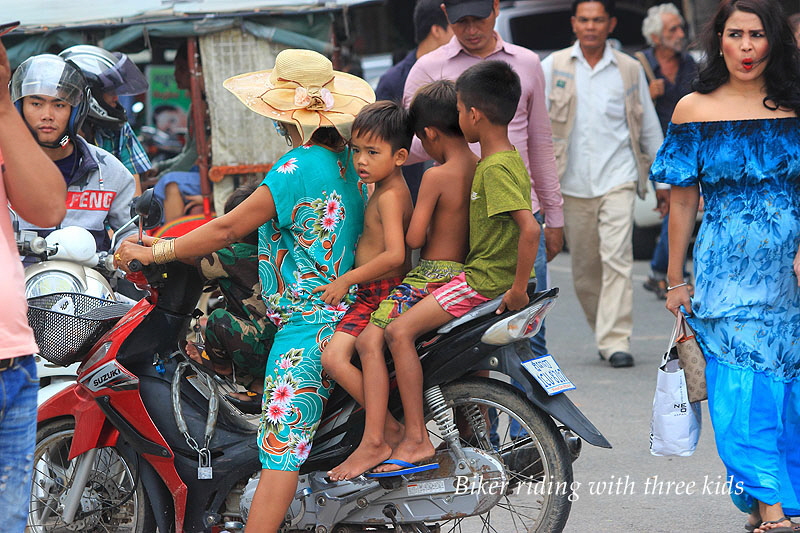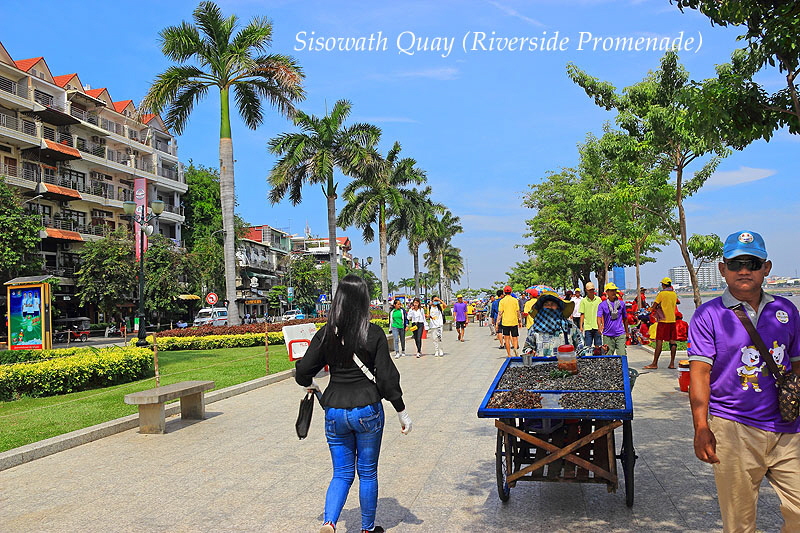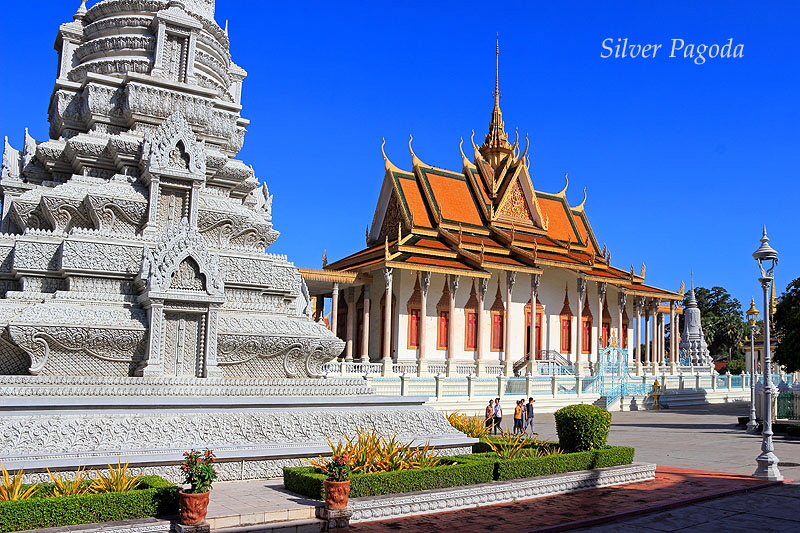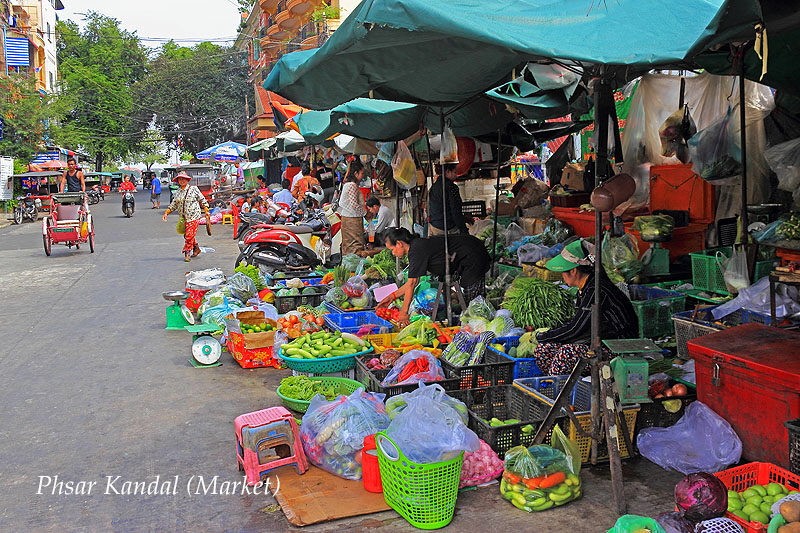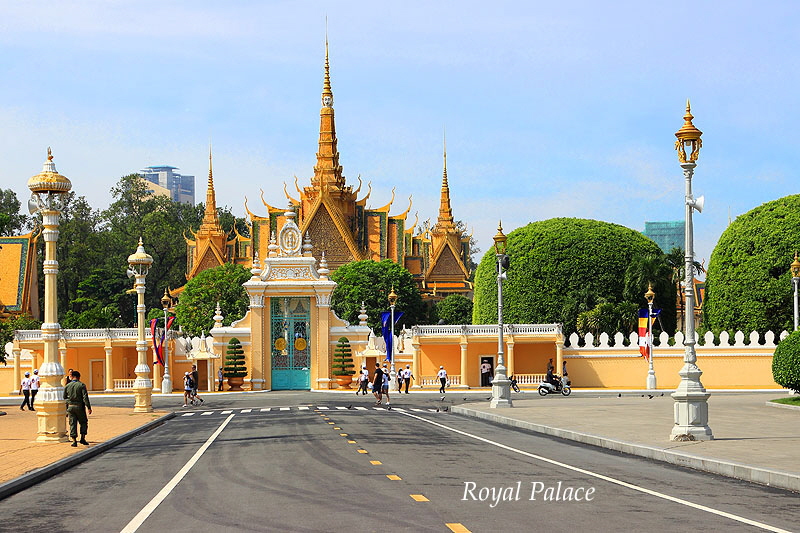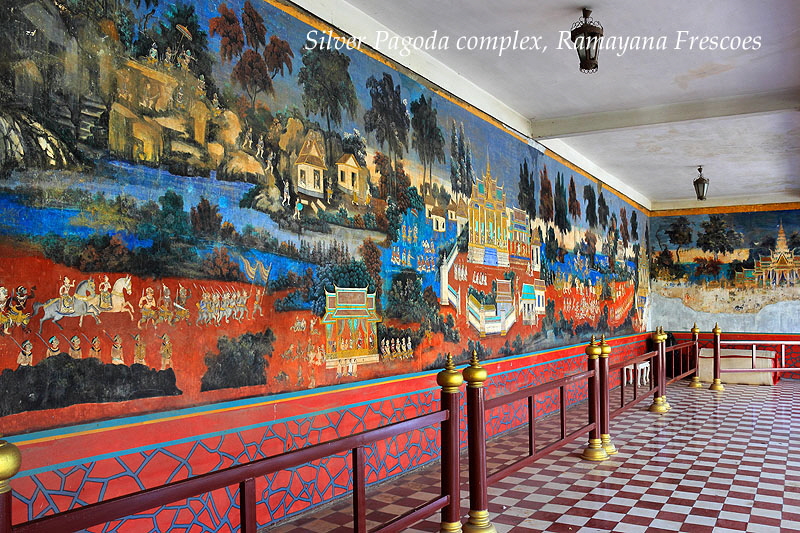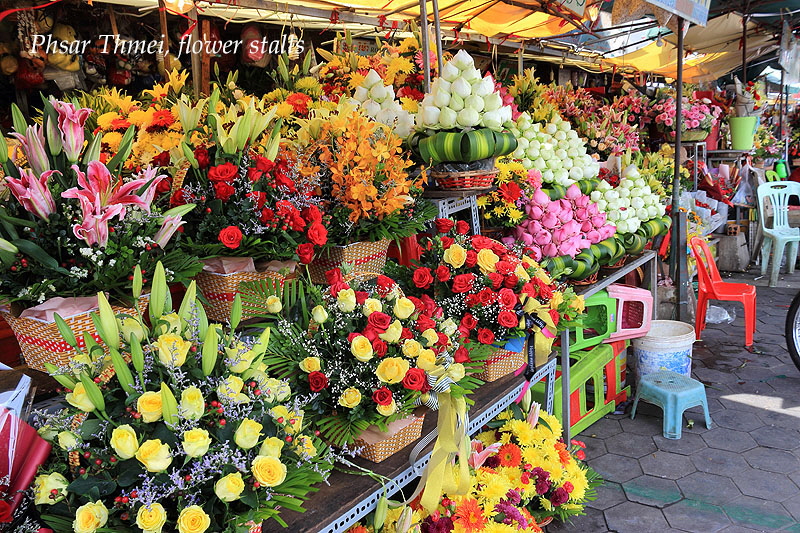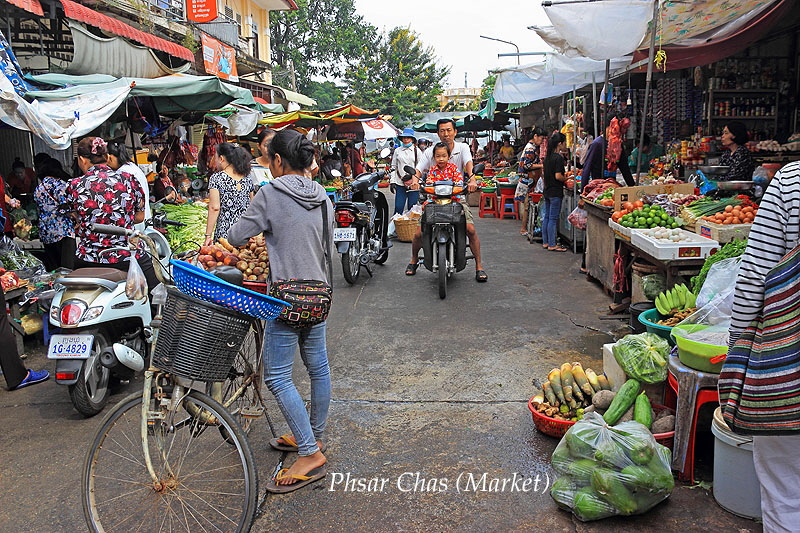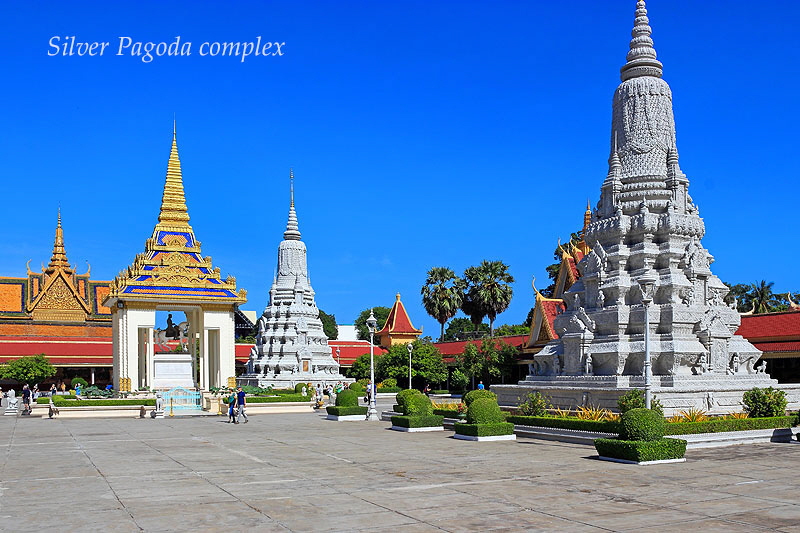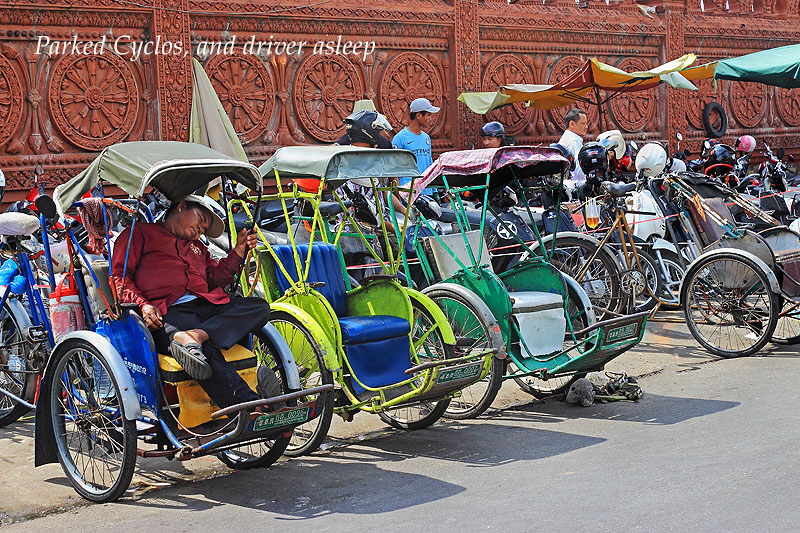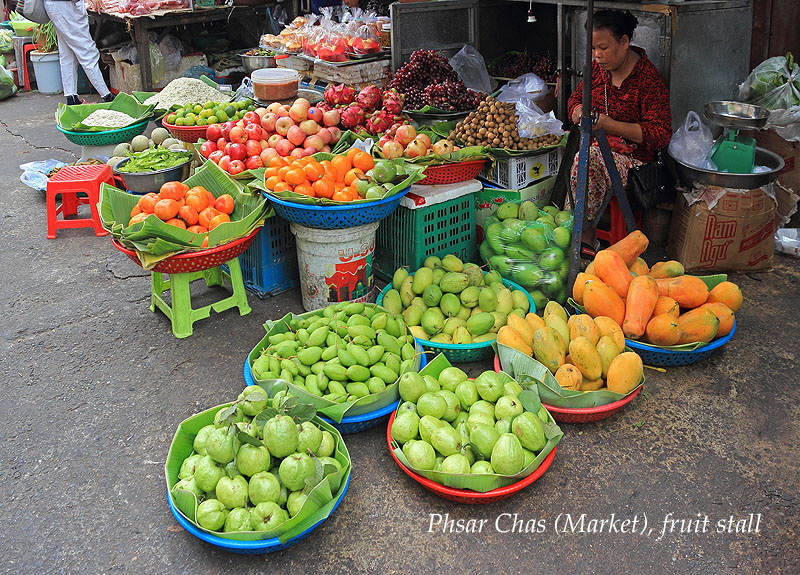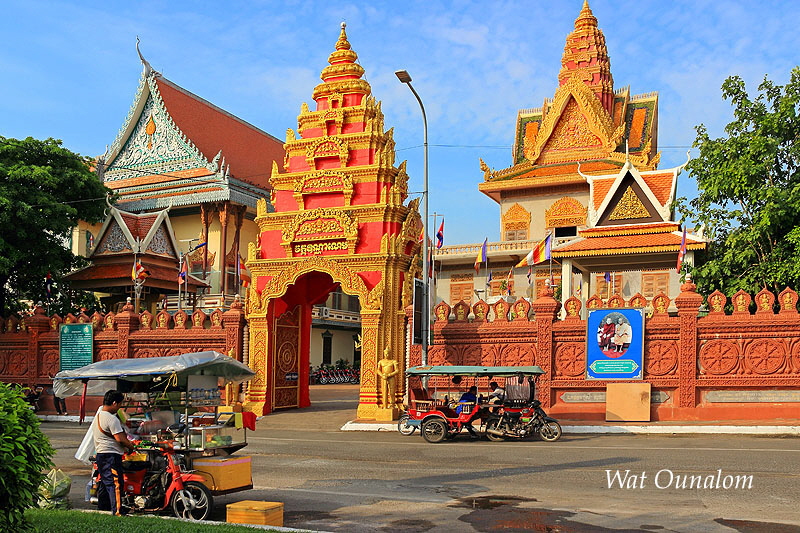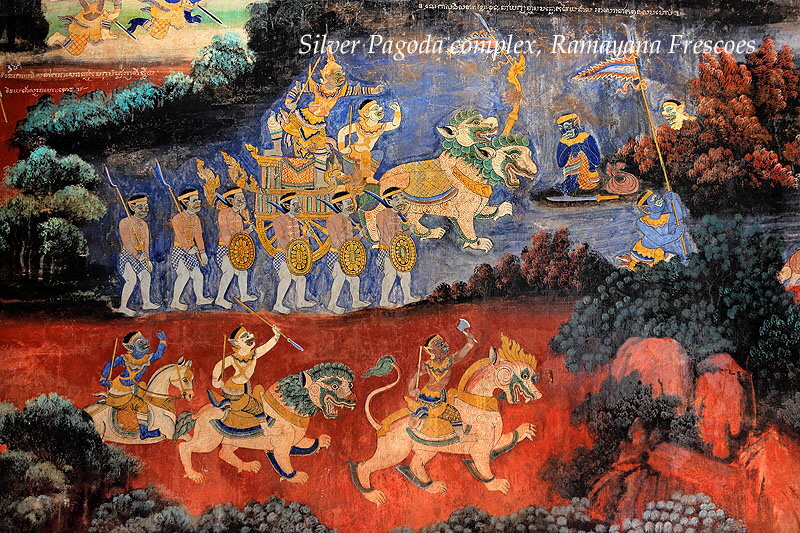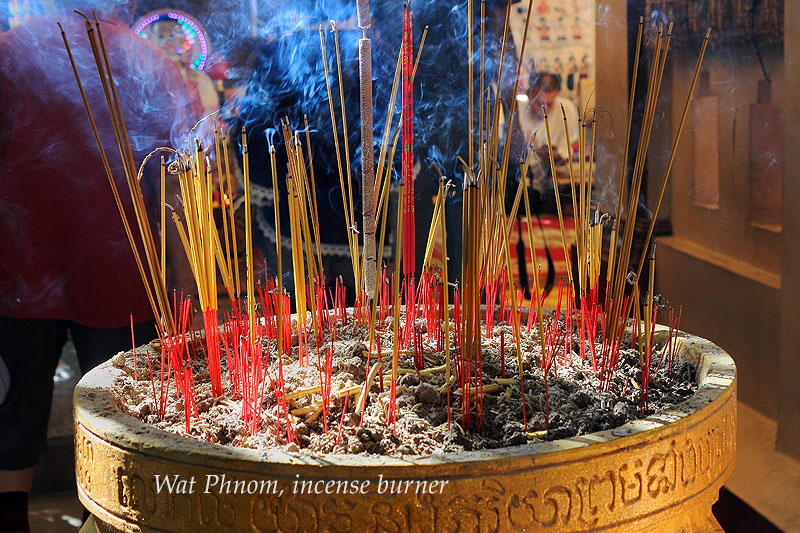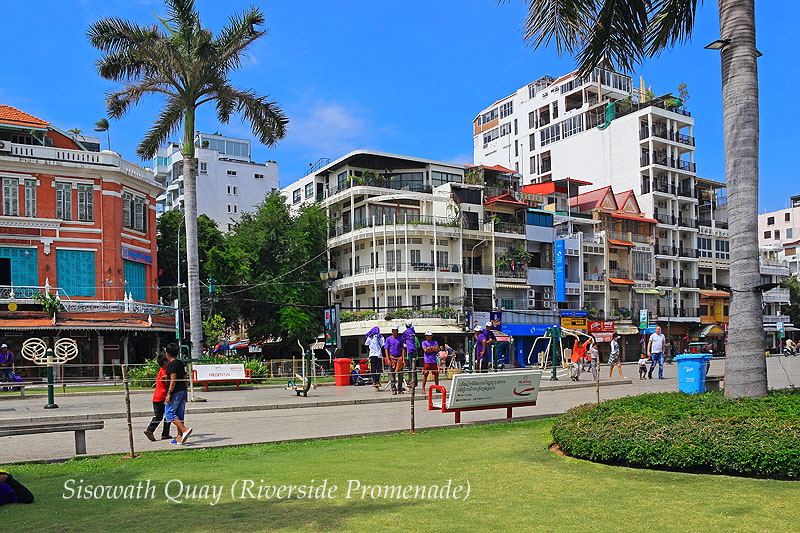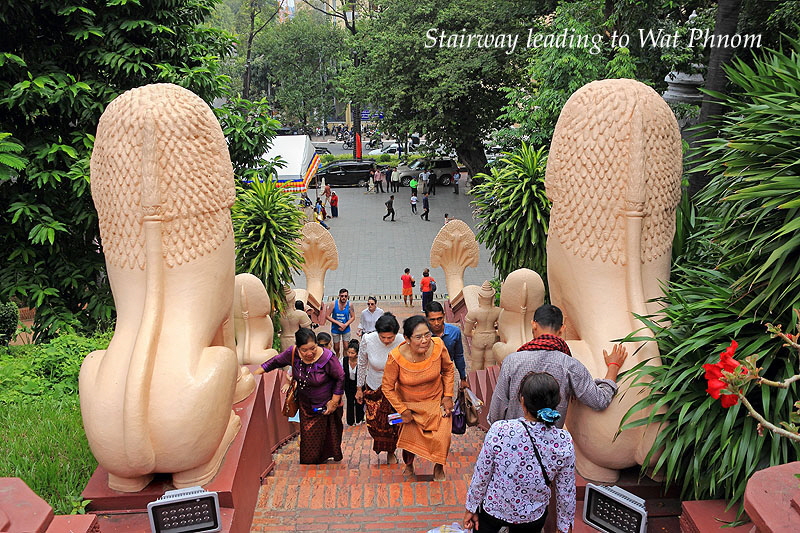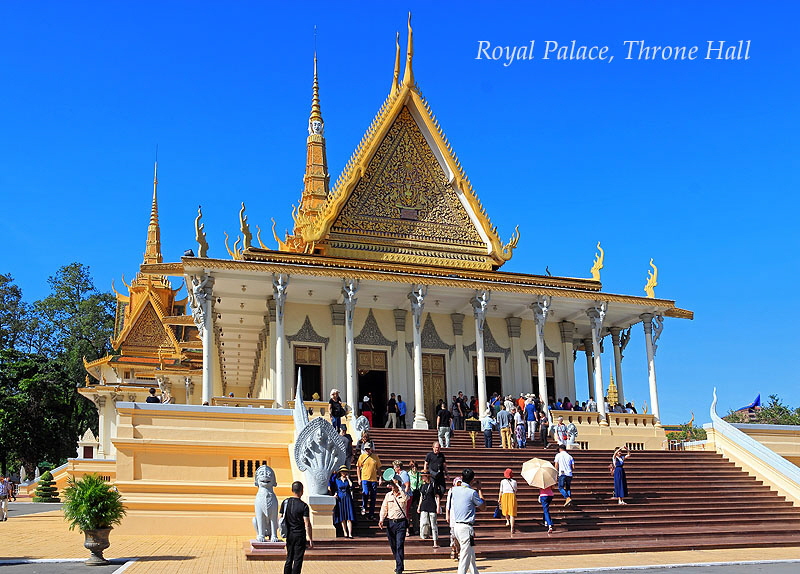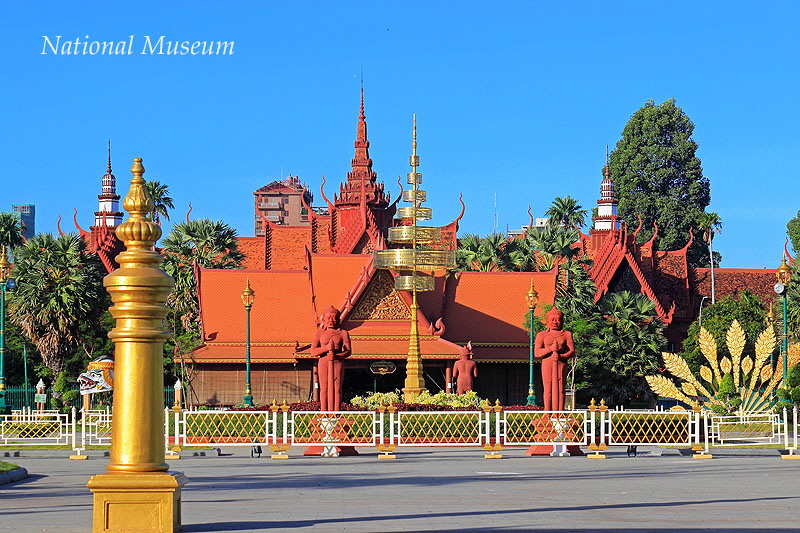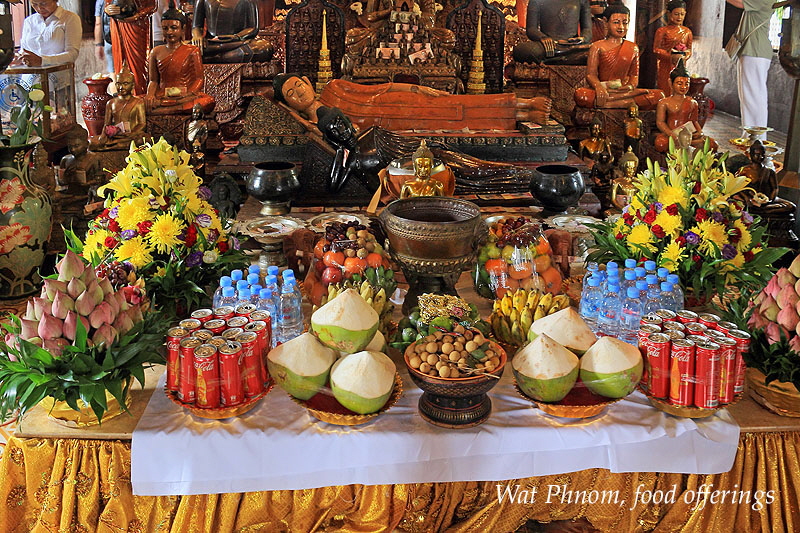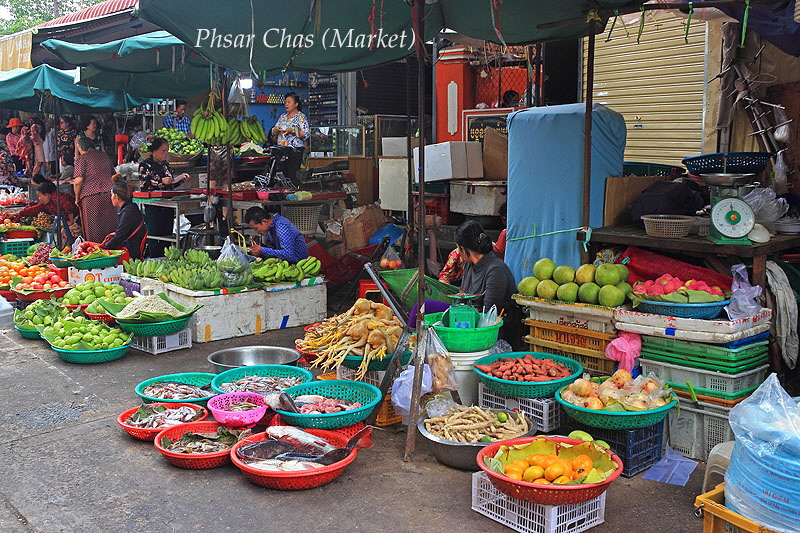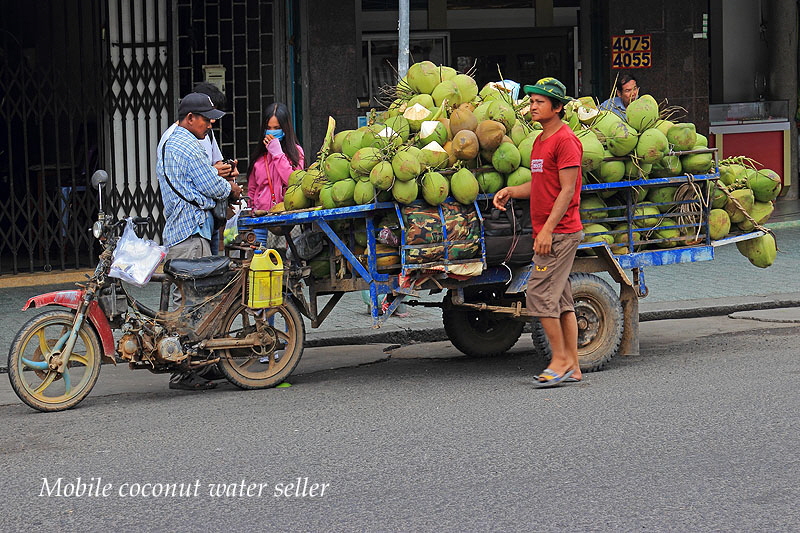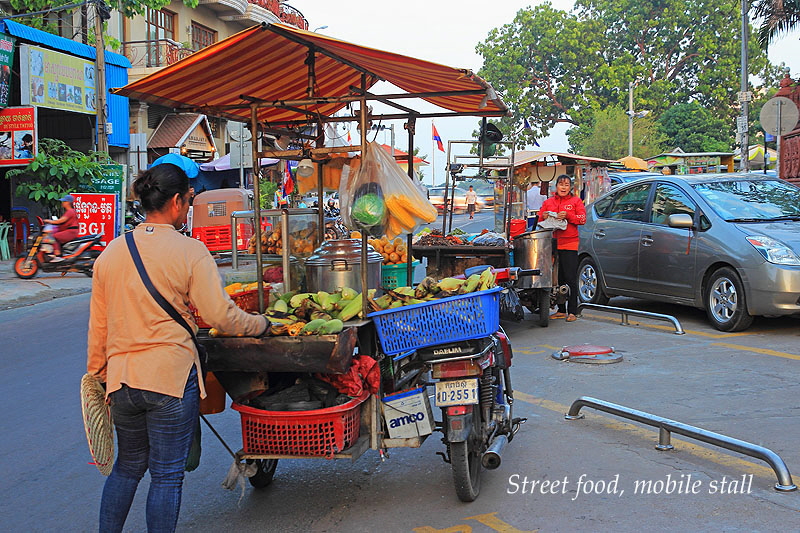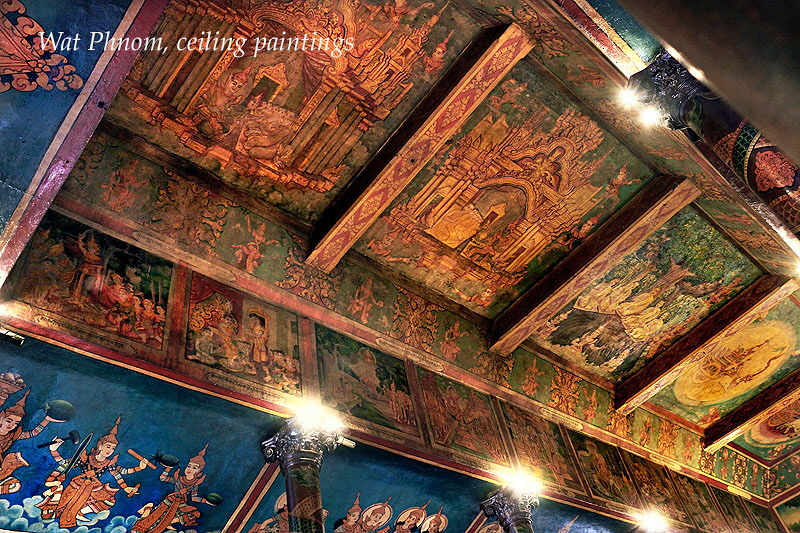Discovering
Cambodia’s capital city
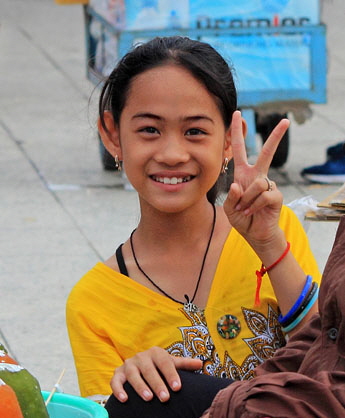
Having spent nearly a month in Cambodia visiting the capital Phnom Penh and onto Siem Reap, I realised it would be difficult to contain it all in one article. So do check out my experiences in Siem Reap.
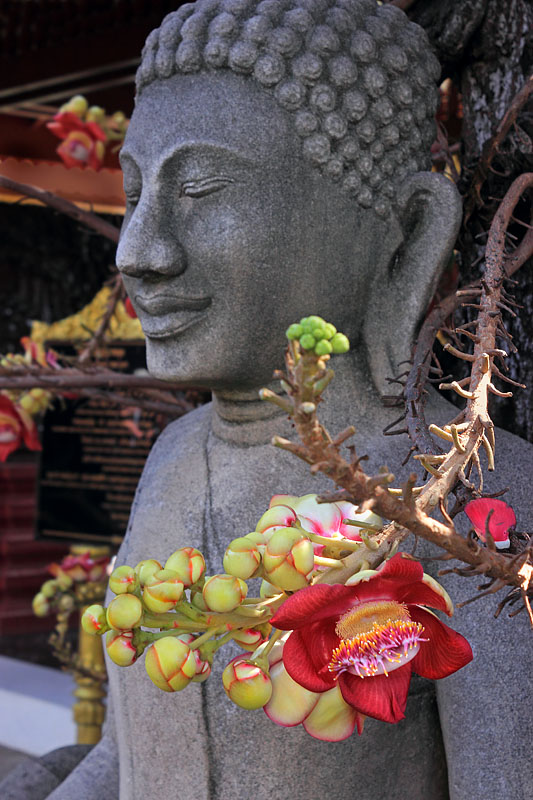
Pleasant times in Phnom Penh
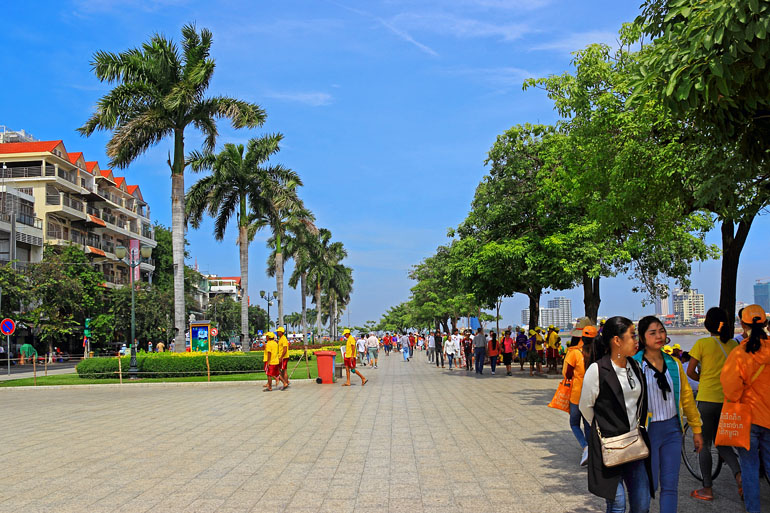
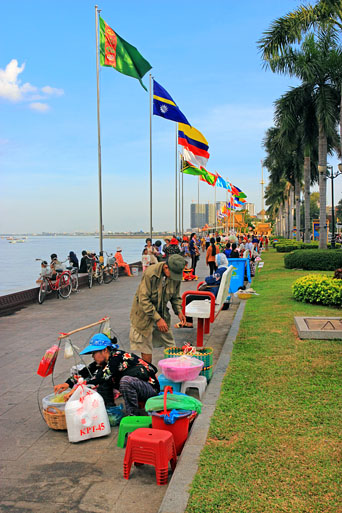
Sisowath Quay
The day I arrived in Phnom Penh was beginning of the Water Festival (see separate feature). Having enjoyed myself during this event, I was anxious to see some of the highlights and lifestyle of this compact city.
Whichever time you decide to visit, it’s going to be hot. I visited in November, when the dry season had begun and the temperatures were slightly lower at about 28C. Although many of the sights are within walking distance, hopping onto a tuk tuk (around 2-3 dollars for a short hop) will ease the strain of midday temperatures.
I was staying in city centre, overlooking the 3km long Sisowath Quay (waterfront promenade) and Tonle Sap River. It’s a good area, popular with tourists, many hotels, and a good base for sightseeing. The day should begin with a good breakfast, and nothing like a hot steaming chicken noodle soup (for just $3) from the street corner cafe can set you up better.
French colonial style buildings

Royal Palace, Throne Hall
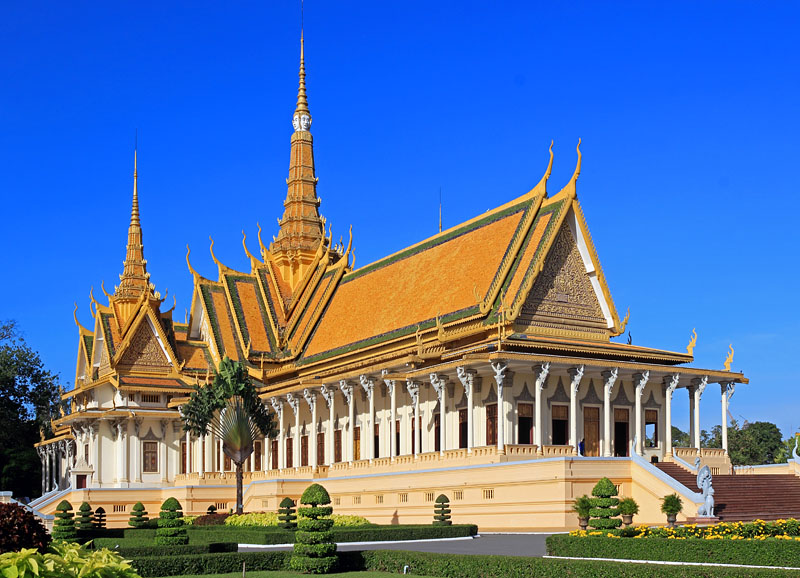
The number one attraction here is the famous Royal Palace, official residence of King Sihamoni. An early morning 15 minute stroll, passing several French colonial style buildings, then along the seafront promenade brought me to the entrance, and I was one of the first arrivals to get in before the tour buses arrived.
Frangipani flowers
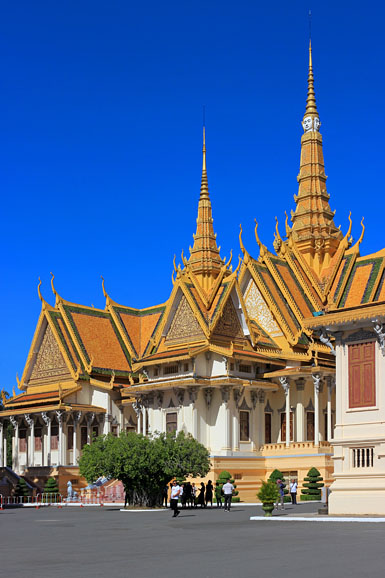
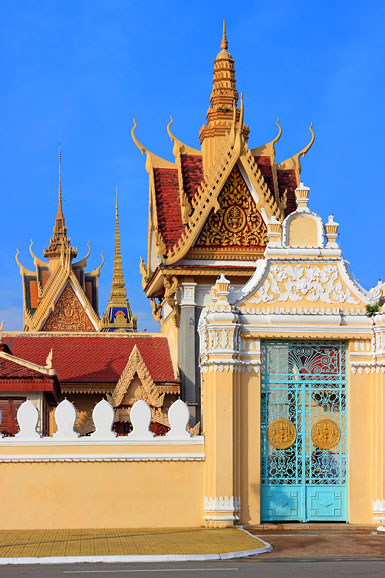
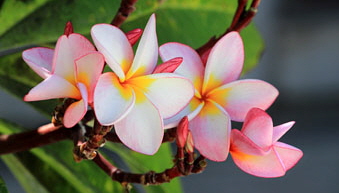
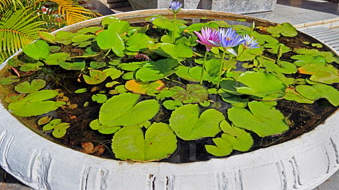
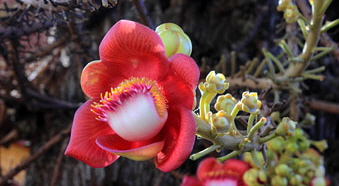
Cannonball flowers
You are given a small map highlighting the main structures, but having a guidebook or better still hiring a ‘student guide’ as I did, for $10 was useful. However halfway through we drifted onto chatting about his lifestyle, is family and Buddhism, all which I enjoyed very much. Later I continued to explore on my own.
The first thing you notice is the spectacular vista of the buildings with gilded roofs, amidst the vast landscaped gardens. And dominating it is magnificent Royal Throne Hall with its three spires. It is the king’s audience hall. Originally constructed in 1870 by King Norodom, and rebuilt in 1919 by King Sisowath it is a stand alone example of classic Khmer architecture. And yes it does resemble some Grand Palace buildings in Bangkok. In the complex are many other grand buildings, surrounded by neatly trimmed hedges, privets, and flora like Frangipani, bougainvillea, cannonball flowers and water lily ponds. Gardeners were at work sweeping away fallen leaves, and ensuring the paths were kept tidy. As I was there early, it was a delight to walk around and enjoy the place undisturbed.
Bell Tower
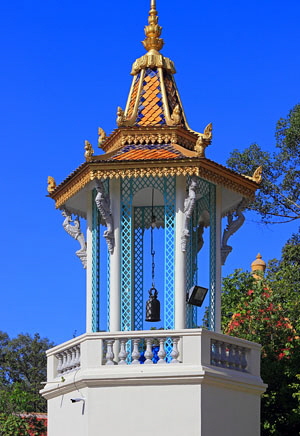
Silver Pagoda
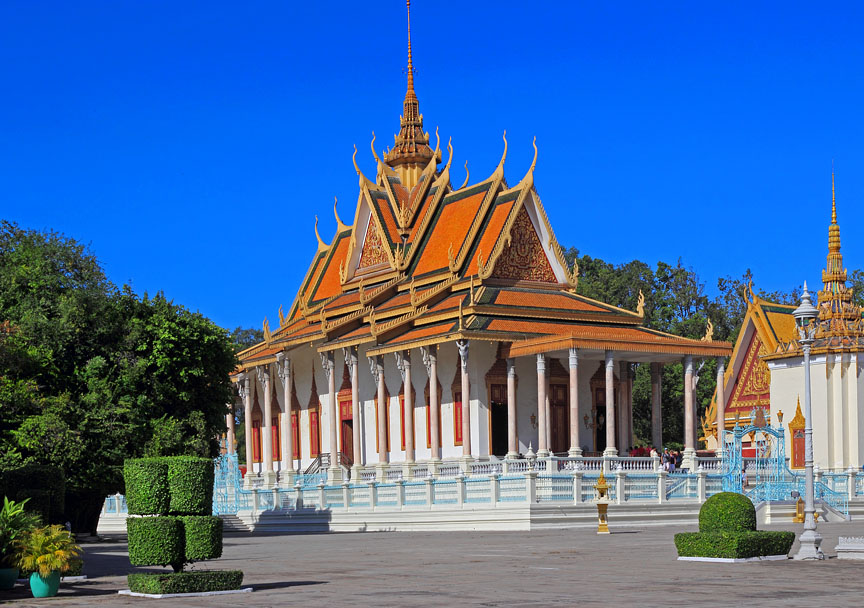
Adjoining the palace complex, you enter the ornate Silver Pagoda (Wat Preah Keo) or ‘Temple of the Emerald Buddha’. The name ‘silver’ comes from the silver laced marble floor tiles that cover the entire pagoda. Inside (no photography allowed), the walls are lined with ancient art, rows of Buddha figures and central to all, a life size golden Buddha statue covered by over 2000 diamonds.
Princess Kantha Bopha stupa
Ramayana frescoes
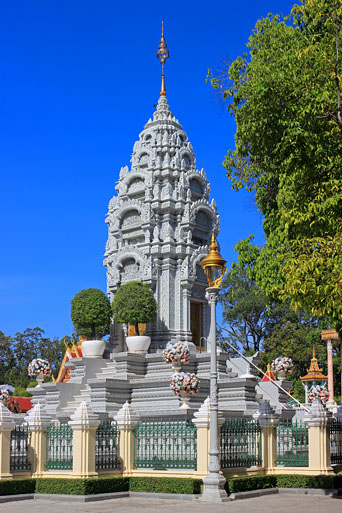
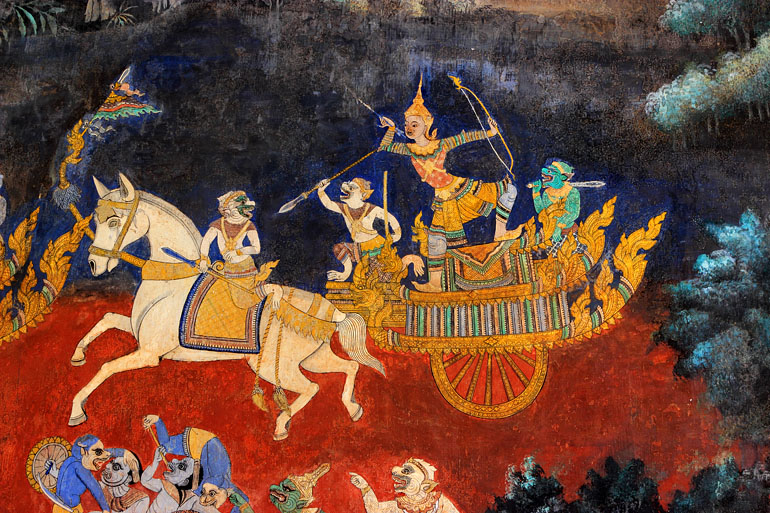
King Norodom pavilion
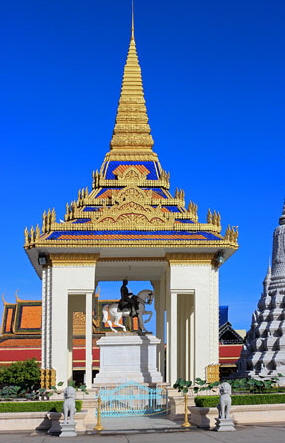
The complex has many other buildings, bell towers and lovely stupas. The Silver Pagoda complex is enclosed by walls, and parts of it are completely covered by Ramayana Frescoes (of classic Indian stories), painted around 1900.
These two sites were more than what I expected, and a wonderful morning spent. Leaving the premises, past a royal guard I paused to watch a tourist taking a selfie with the guard, who was trying hard to keep an expressionless look. However, as a couple of others started to take photos, he could not help but burst out in a friendly laugh.
What looks like a temple, next to the Royal palace is the National Museum of Cambodia. The attractive brick-red building contains the largest collection of Khmer sculptures in the world.
Royal guard
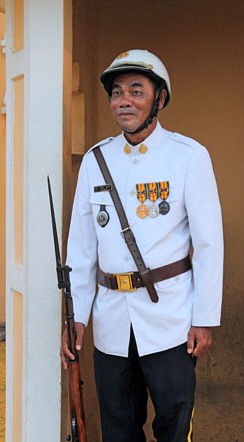
Wat Ounalom
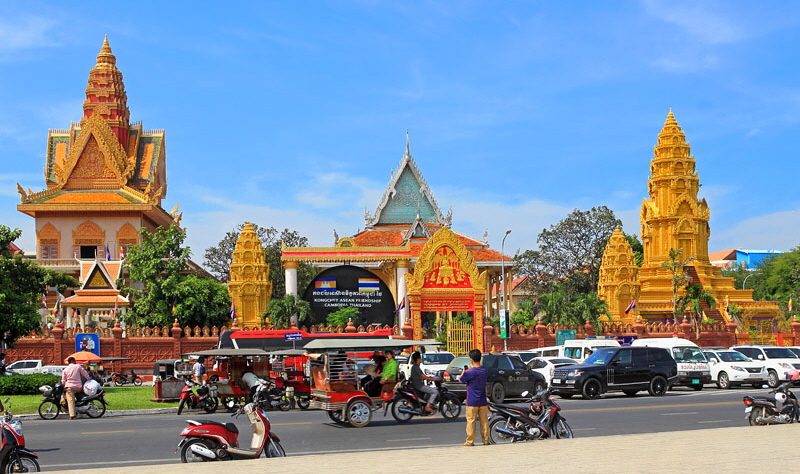
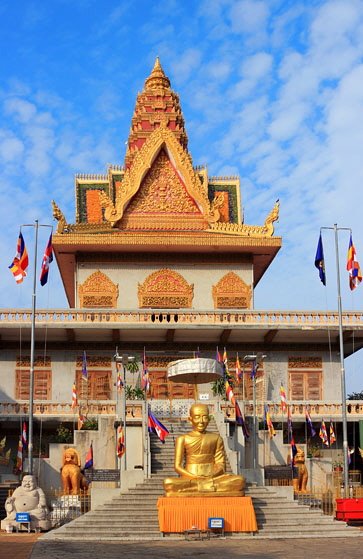
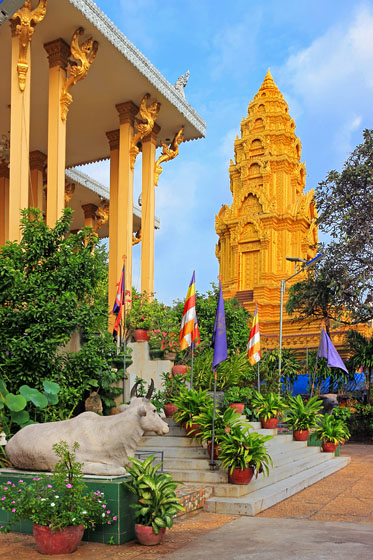
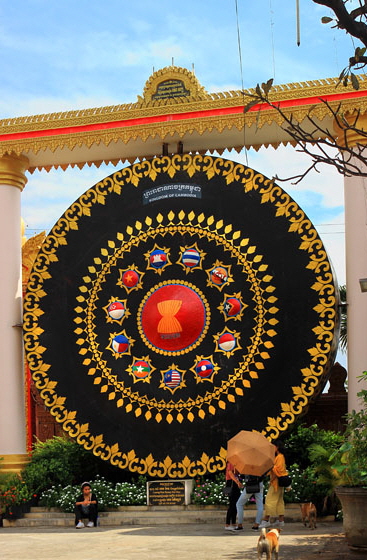
Wat Ounalom
Close to the Royal Palace and also facing the riverside, is the Wat Ounalom (temple). Established in 1443, its main stupa is believed to hold an eyebrow hair of the Buddha. Although many of the buildings were destroyed by the Khmer Rouge (in 1975-79), much has been restored and is the centre of Cambodian Buddhism. Modest in size and complexity, it is still worth a stop to admire its buildings, chedis, sculptures and statues. There is a huge gong depicting flags of ASEAN countries symbolising friendship. It is a also working monastery with many monks residing here.
Wat Ounalom, sculpture
Wat Ounalom, huge gong
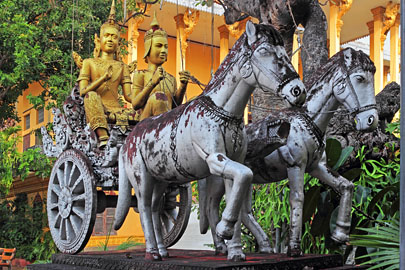
Wat Phnom
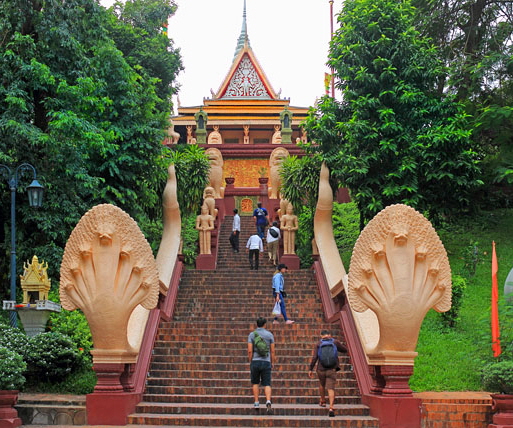
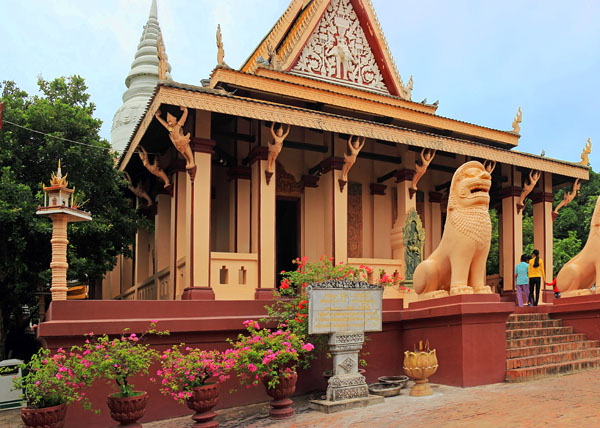
Wat Phnom - Devata sculpture
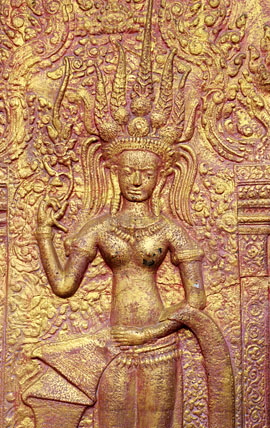
From the temple, it’s about a 30 minute walk or 10 minutes by tuk tuk to the tree covered hilltop Wat Phnom. A short flight of stairs will take you up to the main shrine hall. Inside is a glittering large bronze seated Buddha, surrounded by smaller statues in several postures. The walls and ceilings are covered with murals depicting Buddhist stories. Here worshippers bring in their food and floral offering and the atmosphere is peaceful, and the air is infused with the fragrance of burning incense.
Nearby is also a stupa, several shrines and small spirit houses to worship at. Around the grounds are also some exquisite bas-relief sculptures of Devatas or Apsaras - female deities or celestial dancers. The temple and picturesque grounds attract wedded couples for photo shoots, and a couple, in smart traditional Khmer wedding attire, kindly permitted me to photograph them.
Wat Phnom - wedded couple photo shoot
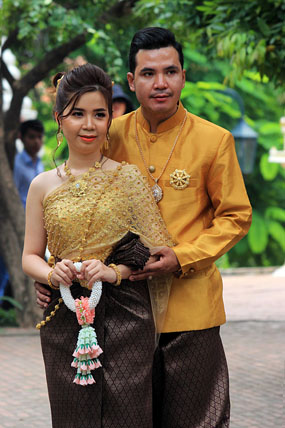
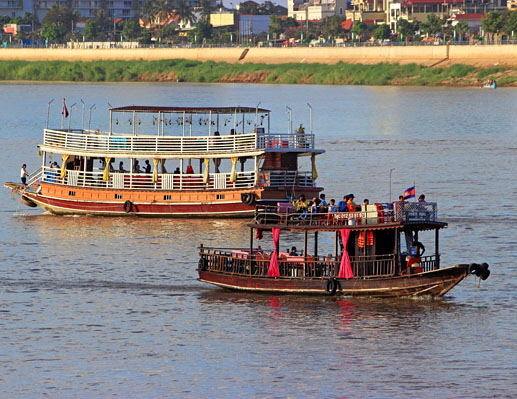
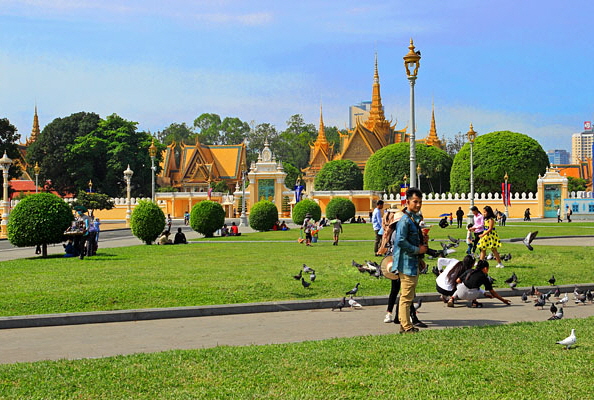
Back in Sisowath Quay, as the evening draws in, the cruise boats come into view, inviting tourists for an evening along the Tonle Sap river with dinner and drinks. Actually, it’s quite a quite a relief after a days sightseeing in the tropical sun to just sit back and relax. The cruise itself is not that exciting, except for views of the city and Royal Palace from a river vantage.
Norodom Sinahouk Monument
Independence Monument
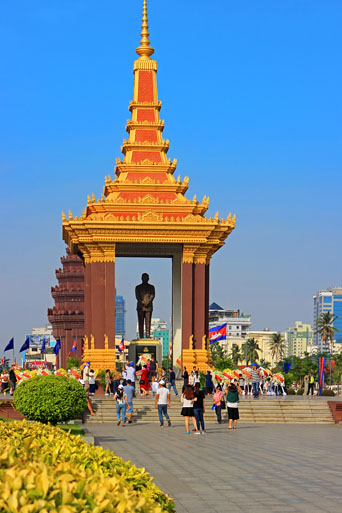
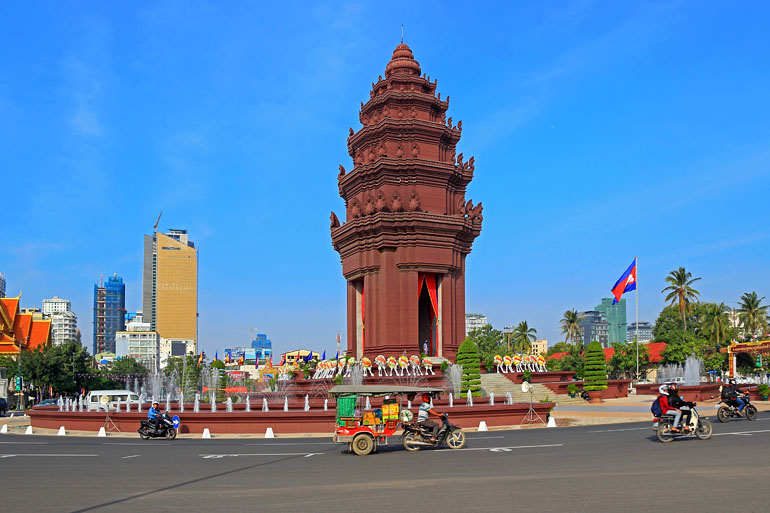
Phnom Penh has many green spaces and parks ideal for meandering and people watching. It also has three important monuments not to be missed. Walk south from the Royal palace area towards Botum Park. Here you’ll find the Cambodia-Vietnam Friendship Monument. The tall concrete structure built in the late 70’s, features heroic statues of soldiers, with mother and baby civilians, and commemorates alliance following the overthrow of the Khmer Rouge regime.
Proceed further south to the end of the park, and on your right is the long Neak Banh Teuk Park, neatly landscaped with privets and grass areas. Here is The Norodom Sihanouk Memorial to the former king of Phnom Penh. The 4.5 metre statue of him is housed in an open stupa like pavilion.
At the end of the park is a large roundabout and in the centre is the Independence Monument. This 20 meter high Angkor Wat style (some say lotus bud shaped) tower is a city landmark and was built to celebrate independence from the French in 1953.
Friendship Monument
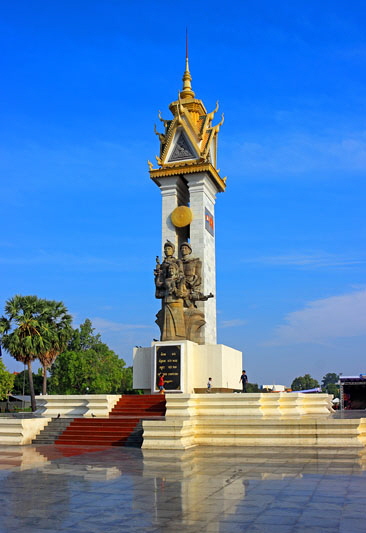
7 on a bike
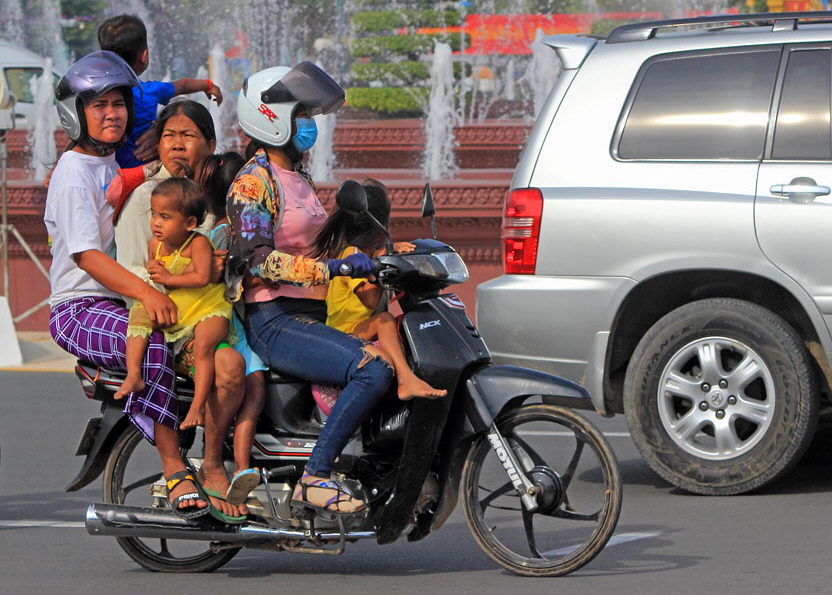
By the roundabout and Neak Banh Teuk Park is a great place to hangout and observe other people who come to enjoy or picnic by the park. The traffic circling the roundabout is fascinating to watch. Cars, bikes, mopeds and tuk tuks all merge without incident or accident, yet would make me a very nervous driver. Some bikers carry more than a couple of passengers. My favourite photo was of 7 people (3 adults and four children) on one bike!
Sisowath Quay
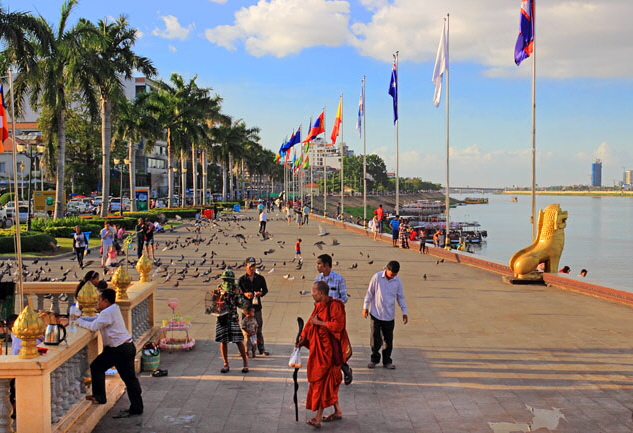
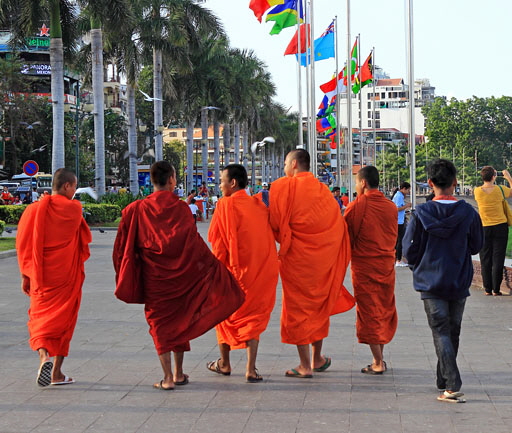
Walking back toward Sisowath Quay promenade, early evening, the temperature feels cooler. The breeze from the Tonle Sap river pleasantly carries along the waterfront making it ideal for an evening stroll, and is enjoyed by couples, families, and monks in their saffron robes. It’s also a great spot for more people watching, and to have small talk with someone sharing a park bench with you, and in-between grabbing a bite, as mobile vendors set up for the nights trade.
Street food, a must
Cambodian sausage on a stick
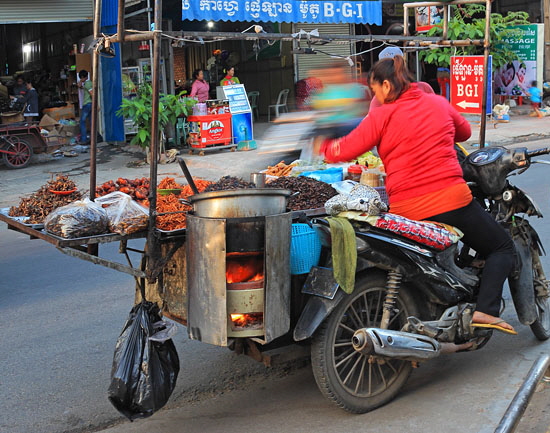
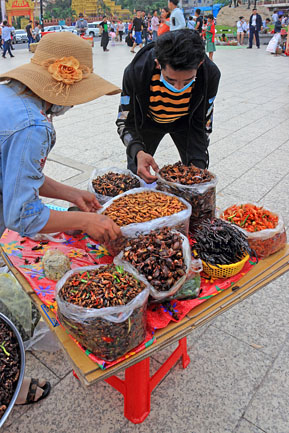
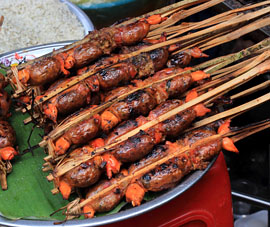
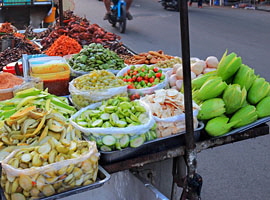
Street food is cheap and excellent, an average $1 an item. Grilled meats and tapioca, rice and noodle dishes, Cambodian sausages are common, as well as the more exotic items like insects. The river front restaurants, cafes and bars are busy throughout the day, and the night-clubs in the evenings, when the music adds to the cacophony. But the atmosphere is relaxed and feels safe with locals and tourists mingling and are there just to have a good time.
If a good time also means ‘shop till you drop’, Then Phnom Penh may disappoint. There are a few shopping centres, but don’t expect luxurious mega malls teeming with designer brands. The city does have its fair share of markets selling high quality local products.
Custard Apple (left) and Mangoes
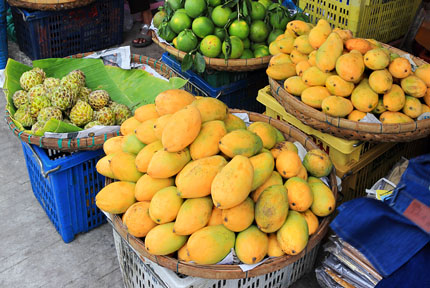
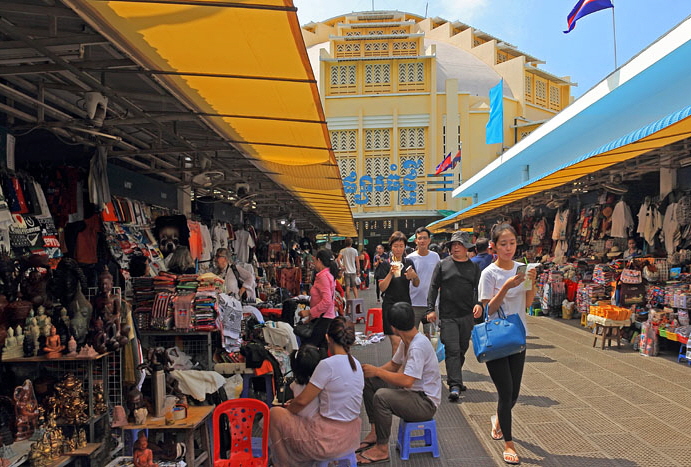
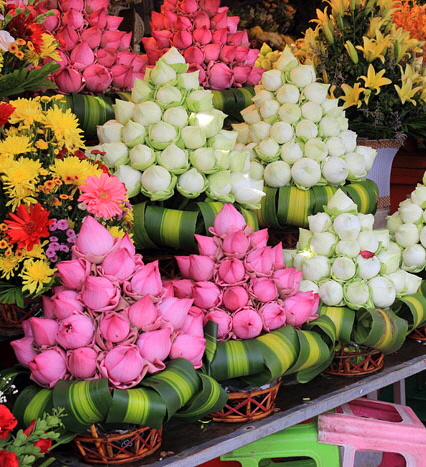
Central Market (Phsar Thmei)
Flower market - Lotus
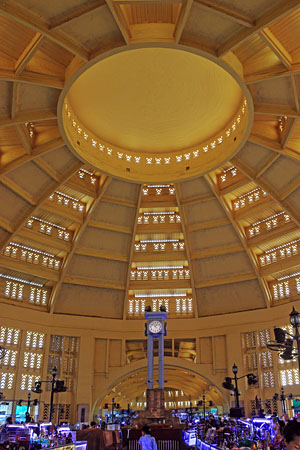
The Central Market (Phsar Thmei), is a large art deco building containing hundreds of small shops and stalls, selling crafts, antiques, jewellery, silver and brassware. The building itself is quite interesting with an immense yellow-ochre shaped dome. The clothing section sells everything from traditional attire and sarongs, to knock-offs. In the outdoor part of the market is also a colourful flower market, with lotus, roses, lilies all beautifully displayed.
Near the Central Market is also the multi storey Sorya Shopping Centre, with almost similar products, but with a food court and is air conditioned.
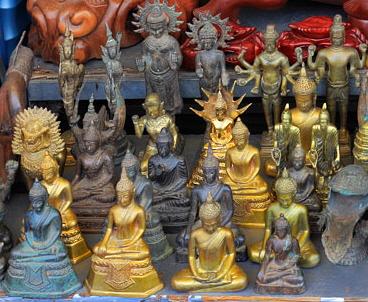
Phsar Chas (market)
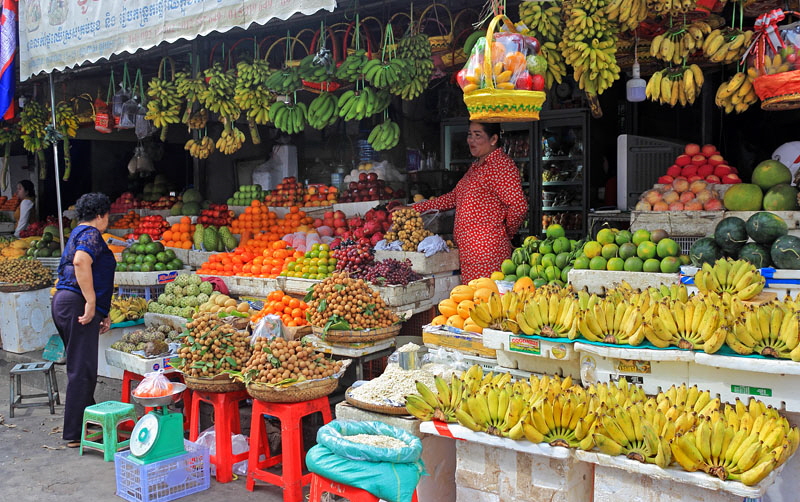
For me, nothing beats the local street markets, and it surprised me how many there are. Many are open as early as 6 am. Some are just one long street while others are a maze of narrow paths and alleyways crowded with local produce - fruit like mangoes, custard apple, jakfruit, frogs, river fish and seafood. Stalls are overflowing with vegetables, some which I’m not familiar with. As early as 8 in the morning, some streets get so congested, that you come to a halt, with bikes, bicycles and people all trying to squeeze past. Two of my favourite markets, which I came across by chance are Phsar Chas, Phsar Kandal (you can actually find them on Goole maps too) and all within walking distance from the waterfront area.
Phsar Kandal (market)
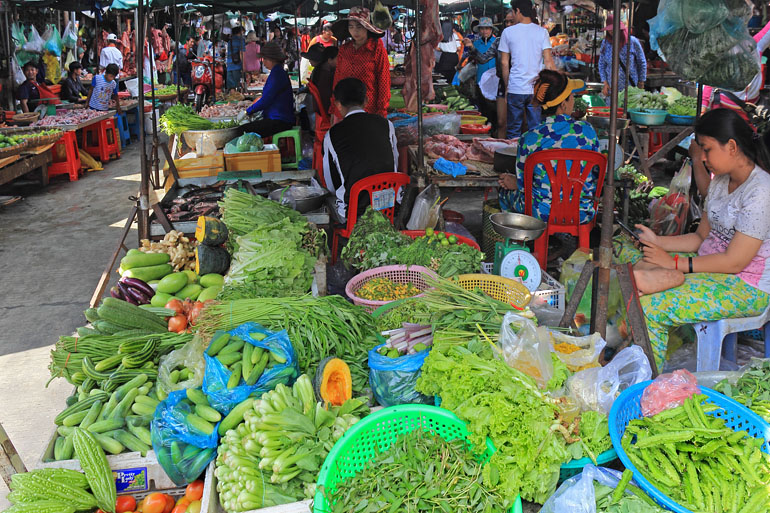
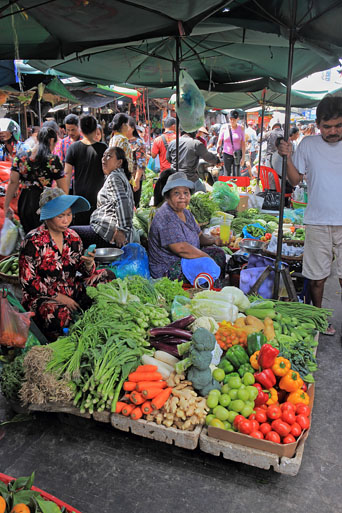
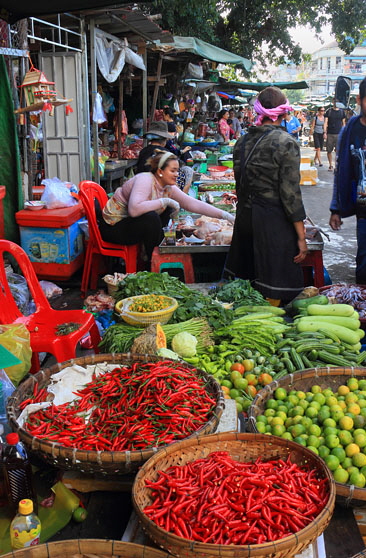
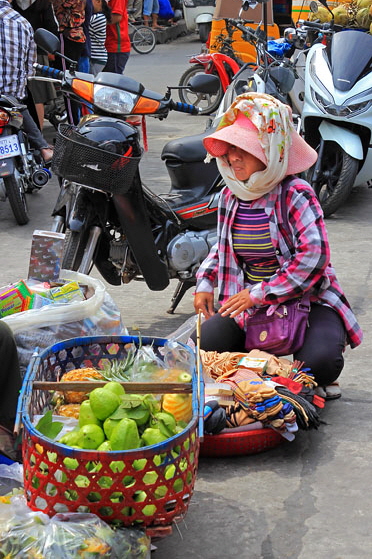
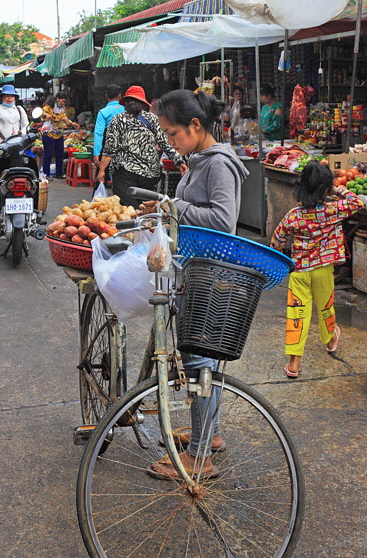
I discovered a nice night market too - located at the north end of the riverside promenade. The stalls are bursting with the usual crafts and souvenirs. The friendly vendors constantly try to entice you with their goods, and is a good place to pick up a bargain or two. The lively atmosphere begins around 8 pm with locals expressing their musical talents in song, and dance the night away.
Despite knowing what I was expecting to see, Phnom Penh was still very much a serendipitous place, enjoyable and memorable, and prepared for me for my next destination - Siem Reap and Angkor.
Phsar Chas (market) fish market
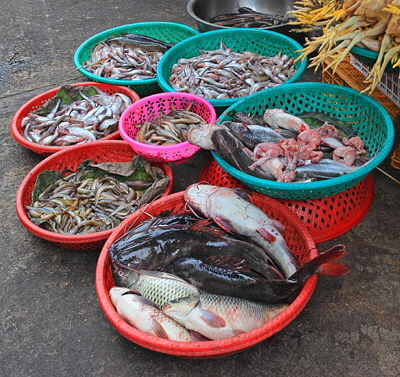
Night traffic along road, by Sisowath Quay
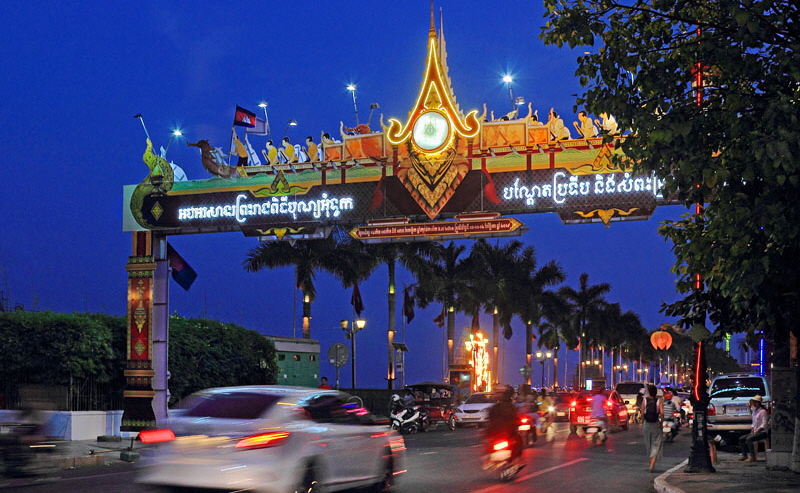
Fact File:
Getting there: There are no direct flight to Cambodia. I flew with Air China via Beijing. Most Asian airlines have daily connecting flights to Phnom Penh.
Entry requirements: You can easily obtain an visa online, or on arrival and costs around US$30.
Getting around: Cyclos and tuk tuks are the best for short trips, and the fare should be agreed first.
Language issues: Most people do speak some English, although a few tuk tuk drives may struggle a bit.
Money matters/tipping: Although the Cambodian Riel is the official currency, the US dollar is popular and is accepted everywhere. Tipping is not expected. However be aware that most people earn very little, and tipping wherever you can will be appreciated.
Shopping: Other than in large shops, haggling is normal. Still, do not let the vendor lose face, and accept the final price he/she is willing to sell.
Politics: Cambodia has a war torn history, and the genocide by the Khmer Rouge and the horror of American bombings have been a major part of it. And most people in the country have lost a loved one as a result. Avoid discussing these issues.
24 images here ©JAYTRAVELPHOTOS
© COPYRIGHT notice. The images on this site are for viewing only.
To purchase any, for personal or commercial use, please contact us at jaytravelphotos@aol.com
